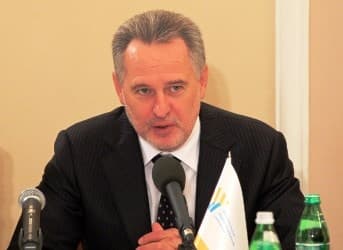Russia’s surprising move to offer Kiev a ‘gas discount’ marks the return of Ukrainian oligarch Dmytro Firtash to the international energy scene, a move that speaks volumes on the current state of affairs between the two nations.
When Russia’s state-owned giant Gazprom announced it was granting Ukraine a ‘gas discount’ of approximately 35% last Wednesday, many commentators were unsure what to make of it. The announcement was carefully crafted to appear as charitable “assistance” from the Kremlin to its eastern neighbor, who has long accused Gazprom of overcharging the Ukrainian national oil and gas company Naftogaz. In 2012, Ukraine paid $430 for a thousand cubic meters of Russian gas while Germany paid only $379 for the same amount.
The first interpretation would be to see the gas discount as a strategic shift in Russia’s intensifying quest to convince Ukraine not to sign a free-trade ‘Association Agreement’ with EU leaders at an upcoming summit in Vilnius, Lithuania this November. Putin is hoping the country will instead opt for his signature ‘Eurasian Union’ alongside Belarus, Kazakhstan and, most recently, Armenia. So far, Russia has taken a characteristically aggressive approach to turning Ukraine’s leaders eastwards, suddenly banning key Ukrainian exports from entering the Russian market over the summer. Despite Putin's best efforts, though, Ukrainian President Viktor Yanukovych seems more determined than ever to pursue closer links with Brussels.
Related article: Gazprom Now Interested in Eastern Mediterranean
The gas discount could thus be viewed as the Kremlin’s ‘good cop’ routine, an attempt to show Ukraine the potential economic benefits (lower gas prices) of joining the Eurasian Union. The gas price offered to the Ukrainian company Ostchem was reportedly US$260 per 1,000 cm3, a discount of more than 35%. At this rate, a sale of 5 bcm of gas would cost Gazprom approximately $700 million.
As Arkadiusz Sarna of the Center for Eastern Studies notes, there are several reasons to believe that, despite the perceived loss, the discount is still very much in Gazprom’s interest. 70% of gas shipped from Russia to the lucrative European markets passes through Ukrainian pipelines and it is therefore of critical importance that Ukraine stores enough gas for Gazprom to fulfill its contracts with EU nations. For months Russia has been demanding that Ukraine increases its gas reserves to around 20 bcm, whereas Ukraine has maintained that its current level of 16 bcm is a sufficient transit level.
Moreover, by selling gas directly to Ostchem, a private company, Gazprom is able to bypass dealing with Naftogaz and, consequently, the Ukrainian government. The announcement of a gas discount coincided with news that a London court partially froze a Eurobond coupon payment by Naftogaz, a move that forced the latter to pay $21.7 million to bondholders. Few can blame Gazprom for wanting to avoid doing business with Naftogaz, which suffers from a multitude of financial and managerial issues. However, it is Russia’s choice to bring Ostchem, and its shadowy owner Dmytro Firtash into the picture that is particularly interesting.
Related article: Tensions Threaten Long Standing Natural Gas Partnership between EU and Russia
Prior to 2006, Mr. Firtash was almost completely unknown outside of Ukraine, despite his estimated $5 billion fortune and status as one of his country’s most influential men. Firtash is best known for heading the RosUkrEnergo (RUE), a company that owned a monopoly on all gas sold from Russia to Ukraine until it was removed in the 10-year gas deal between Kiev and Moscow that followed the 2009 crisis. That Firtash did not have to compete for the enviable position of middleman between Gazprom and Naftogaz testifies to his close ties with the Kremlin. Under the previous Ukrainian government, RUE occupied a central role in natural gas transits with ‘no assets, no track record, and no transparency”, according to researchers Edward Chow and Jonathan Elkind.
Now, Dmytro Firtash looks poised to once again make millions through purchasing Russian gas, as he will be able to sell any surplus after the winter at a much lower price than Naftogaz could ever afford. Faced with the prospect of Gazprom bypassing the Ukrainian government and working directly with their business allies in the country, President Yanukovych and his administration now have more incentive than ever before to work towards reforming Naftogaz while simultaneously diversifying their energy sources.
By. Scott Belinski


















